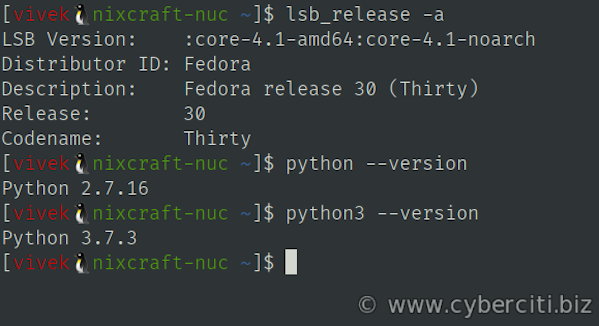
I do not want to use Adobe flash based speed testing site due to security concern on my desktop. How do I install Speedtest-cli on a CentOS Linux or Fedora Linux or Red Hat Enterise Linux (RHEL) for checking the Internet speed?
Adobe Flash vulnerabilities are a major security issue for Linux users and speedtest.net use Adobe Flash. But, you can check the Internet speed with Python based CLI tool called Speedtest-cli. In this quick tutorial you will learn how to install speedtest-cli on a CentOS/RHE/Fedora/Scientific Linux desktop server or or laptop computer.
Install Speedtest-cli on a Linux
The speedtest-cli written in Python. So make sure Python installed and working correctly:python --version
python3 --version
lsb_release -a
Step 1: Install python
Type the following yum command to install Python on a CentOS/RHEL/Scientific Linux:$ sudo yum install python
CentOS / RHEL 8 user type the following command to install Python 3 or 2:$ sudo yum install python3
$ sudo yum install python2
Run the following dnf command to install Python on a Fedora Linux v22+:$ sudo dnf install python
$ sudo dnf install pytho3
Step 2: Download speedtest_cli.py
Type the following wget command to grab the speedtest_cli.py client:$ wget -O speedtest-cli https://raw.githubusercontent.com/sivel/speedtest-cli/master/speedtest.py
$ chmod +x speedtest-cli

Step 3: Check the Internet speed
Simply type the following command:$ ./speedtest-cli
OR$ python speedtest-cli
Sample outputs:
Retrieving speedtest.net configuration... Retrieving speedtest.net server list... Testing from nixcraft Dutch Holdings BV (5.151.xx.yyy)... Selecting best server based on latency... Hosted by SoftLayer Technologies, Inc. (Amsterdam) [6.45 km]: 2.317 ms Testing download speed........................................ Download: 925.88 Mbit/s Testing upload speed.................................................. Upload: 105.69 Mbit/s
To see speed values in bytes instead of bits pass the --bytes option:$ ./speedtest-cli --bytes
To generate and provide a URL to the speedtest.net share results image pass the --share option:$ ./speedtest-cli --share
Of course, you can combine both the options:$ ./speedtest-cli --share --bytes
Sample outputs:

How do I specify a server ID to test against?
First, grab a server list, enter:$ wget http://www.speedtest.net/speedtest-servers.php
To view a server ID, enter:$ more speedtest-servers.php
To search a server ID, enter:$ grep 'city-name' speedtest-servers.php
$ grep 'country-name' speedtest-servers.php
$ grep 'Tampa, FL' speedtest-servers.php
<server url="http://speedtest1.hivelocity.net/speedtest/upload.php" lat="27.9709" lon="-82.4646" name="Tampa, FL" country="United States" cc="US" sponsor="Hivelocity Hosting" id="2137" host="speedtest1.hivelocity.net:8080" /> <server url="http://speedtestnet.rapidsys.com/speedtest/upload.php" lat="27.9709" lon="-82.4646" name="Tampa, FL" country="United States" cc="US" sponsor="Rapid Systems" id="1296" host="speedtestnet.rapidsys.com:8080" /> |
OR just display a server ID:$ grep 'Tampa, FL' speedtest-servers.php | egrep -o 'id="[0-9]{4}"'
Sample outputs:
id="2137" id="1296"
Next use the server ID 2137:$ ./speedtest-cli --server 2137
Sample outputs:

Not a fan of speedtest.net?
No worries. Try wget, lftp or specilized tool like iperf on a Linux to test the Internet or Intranet speed from the command line.
Concolusion
You learned how to install speedtest-cli command line interface for testing internet bandwidth using speedtest.net on a CentOS/RHEL/Fedora Linux. For more information see this page here.